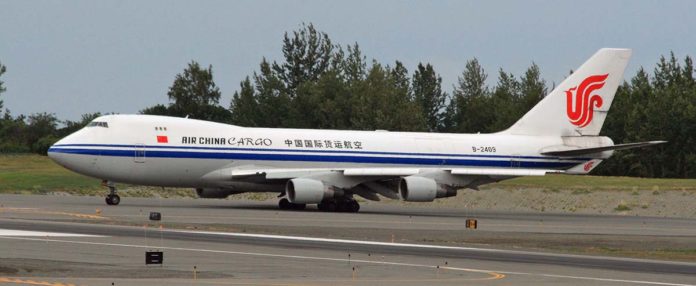The push to invest in e-commerce in diversification attempts for some of the top airline operators out of the Mainland is bearing more fruit for those pursuing it more aggressively, as seen with main aviation companies China Eastern and Air China, who are basing not only their passenger transportation business diversification attempts on e-commerce platforms and synergies but also their cargo businesses.
Both airlines operate out of Macau, with Air China holding a 66.9 per cent stake in local airline Air Macau and China Eastern operating international flights directly to the MSAR, according to each company’s 2016 annual results.
Given the increasingly “fierce market competition, the air cargo transportation industry has relatively underperformed” notes China Eastern Chairman Liu Shaoyong, claiming that the group saw 2.2 per cent average annual growth in the cargo and mail traffic volume in 2016 compared to 10.4 per cent annual growth in the number of passengers carried.
Going from this, the group’s Vice Chairman and President, Ma Xulun, points out that in response to an environment in which “traditional cargo aviation suffered greater impact with the possibility of corporate combination by logistics and courier companies” the group should look to “the rise of cross-border e-commerce . . . [to provide] . . . chances for traditional air cargo transportation to transform.”
The 7.92 per cent drop in the group’s cargo and mail traffic revenues year-on-year, at RMB5.98 billion, came despite a 0.2 per cent increase in cargo and mail traffic volume, hitting 4.87 billion tonne-kilometres, and made up 6.67 per cent of the group’s traffic revenues.
Updraft
Air China also faced a “sluggish” market during the year, according to its Chairman Cai Jianjiang, with “challenges getting even more severe” although the group saw an increase during the year of 6.29 per cent in its cargo and mail volume, coupled with a 4.62 per cent increase in revenue from the sector, hitting RMB115.15 billion.
Cai noted, however, that during the year it had “accelerated its co-operation with couriers and e-commerce companies, which laid the foundation for diversified development”. The company currently operates 15 cargo aircraft and owns a 51 per cent stake in Air China Cargo – whose revenue last year hit RMB9.02 billion, after suffering a 2.24 per cent decrease in cargo and mail transportation revenue.
Nevertheless, its profit contribution to Air China saw a 23.72 per cent year-on-year increase, at RMB11 million, in the wake of it refocusing on couriers and e-commerce companies.
Air cargo and mail revenue contributed by the Macau, Hong Kong and Taiwan segment to Air China, however, still underwent a 9.46 per cent drop, to RMB262.79 million, making up just 3.16 per cent of the group’s overall revenue, shrinking from 3.44 per cent in 2015.
The gross weight of air cargo exported from the city over the course of last year saw a 20.5 per cent increase year-on-year, more than double the growth of cargo in transit, with exports reaching 19,622 tonnes and transit hitting 6,842 tonnes, according to data from the Statistics and Census Service (DSEC). Imported air cargo, however, saw a 13.3 per cent year-on-year decrease, to 6,427 tonnes.
Air China recently announced it would be pursuing mixed-ownership reform of its air freight logistics via its controlling company China National Aviation Holding Company (CNAHC) following the central government’s announcement that it would be pursuing a project to open state-run companies to private capital under the mixed-ownership reform.
























